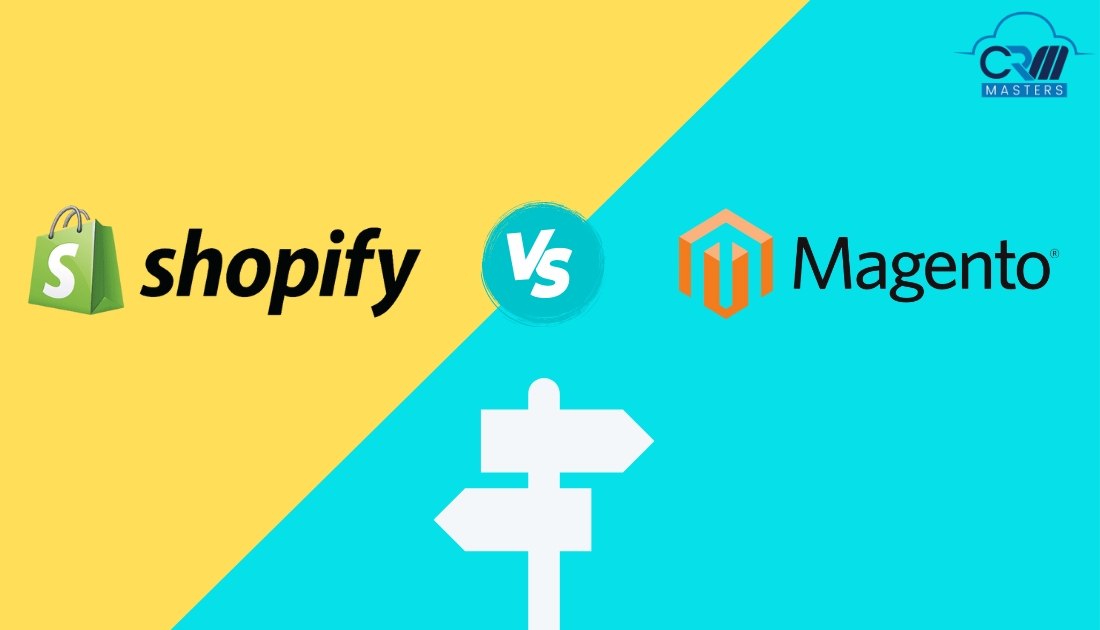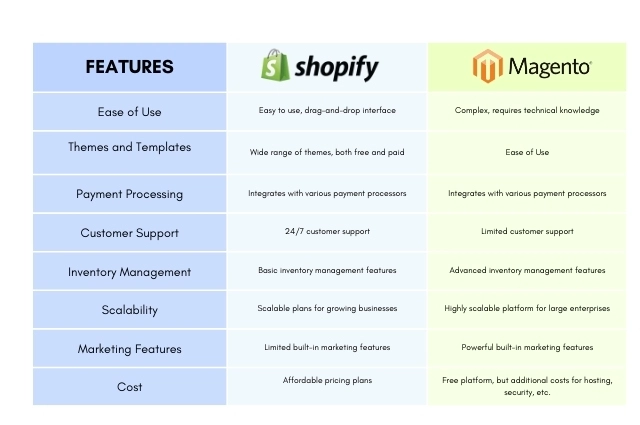
Shopify vs Magento: Understanding the Difference
Shopify and Magento are the two leading giants in the world of e-commerce platforms, empowering millions of businesses to set up and manage their online stores.
Both platforms offer complete features and functionalities to get you started quickly and efficiently. However, they cater to different needs and have distinct advantages and disadvantages.
This blog post will guide you through the core functionalities of Shopify and Magento, highlighting the key differences to help you make an informed decision for your online business.
What is Shopify?
Shopify is a hosted platform, eliminating the need for you to worry about server management and maintenance. It boasts a user-friendly drag-and-drop interface, a vast library of themes and templates, and a wide range of built-in payment processors. These features make Shopify particularly popular among small and medium-sized businesses (SMBs) and entrepreneurs seeking a simple, cost-effective way to launch their online stores.
Here’s a closer look at what Shopify offers:
- Ease of Use: Shopify’s intuitive drag-and-drop interface makes it easy to navigate and manage your store.
- Themes and Templates: Shopify offers a wide range of themes and templates that you can customize to create a unique storefront that reflects your brand identity.
- Payment Processing: Shopify integrates with a wide range of payment processors, allowing you to accept payments from customers easily.
- Customer Support: Shopify provides excellent 24/7 customer support via phone, email, and live chat.
What is Magento?
Magento, on the other hand, is an open-source platform, offering greater flexibility and customization options. However, it requires you to handle your web hosting, which necessitates some technical expertise. Magento is popular among larger businesses and those that require advanced features and functionalities for their online stores.
Let’s explore the key features of Magento:
- Customization: Magento offers extensive customization options, allowing you to create a truly unique and personalized shopping experience for your customers. This level of customization comes with the requirement of coding knowledge or the need to hire a developer.
- Marketing Features: Magento boasts a powerful set of marketing features built-in, including tools for email marketing, SEO optimization, and promotions.
- Scalability: Magento is a highly scalable platform that can handle large volumes of traffic and complex business needs.
Shopify vs Magento: A Feature-by-Feature Breakdown

Choosing the Right Platform: Shopify vs Magento
While both Shopify and Magento are powerful e-commerce platforms, they cater to distinct business needs and technical skill sets. Here’s a breakdown to help you pick the perfect fit for your online store:
Choose Shopify if:
- You’re a Beginner: Shopify’s intuitive interface and drag-and-drop functionality make it ideal for those with no prior coding experience for limited features else you need to hire a Shopify developer if you require scalable, comprehensive, and responsive e-commerce solutions.
- Ease of Use is Paramount: Slemoney Shopify prioritizes user-friendliness. Adding products, managing orders, and setting up basic marketing campaigns.
- Budget is a Major Concern: Shopify offers clear and predictable pricing plans, making it easier to manage your e-commerce expenses. There are no hidden costs for server maintenance or security.
- Your Needs are Straightforward: If you have a limited product range and require basic to moderate customization options, Shopify’s built-in features and app store might be sufficient.
Choose Magento if:
- You’re a Large Enterprise: Magento’s powerful scalability can handle high-volume traffic and complex business needs. It’s ideal for established businesses with a vast product catalog and demanding requirements.
- Customization is Crucial: Magento offers unmatched control over the look, feel, and functionality of your online store. With coding expertise or a developer on board, you can create a truly unique and personalized shopping experience.
- Advanced Marketing Features are Essential: Magento boasts a powerful set of built-in marketing tools, including functionalities for email marketing, SEO optimization, and targeted promotions.
- You Have the Technical Resources: Magento requires some technical knowledge for setup, maintenance, and customization. If you have an in-house developer or are comfortable working with a development team, Magento’s flexibility can be a major advantage.
Also Read: What is Shopify, and How does it Work?
Build Your E-commerce Dream with Us!
The perfect e-commerce platform empowers your business to thrive online. By understanding the strengths and limitations of Shopify, Magento, and other options, you can make a well-informed decision that aligns with your specific needs and goals.
CRM Masters offers clients expert design solutions for various e-commerce ventures, both new and existing so that they can market their offerings to a wider audience and manage their orders sequentially and effectively.
Remember, a successful online store goes beyond just the platform. Focus on building a strong brand identity, implementing effective marketing strategies, and providing an exceptional customer experience. With the right guidance, you can turn your e-commerce dream into a reality.












